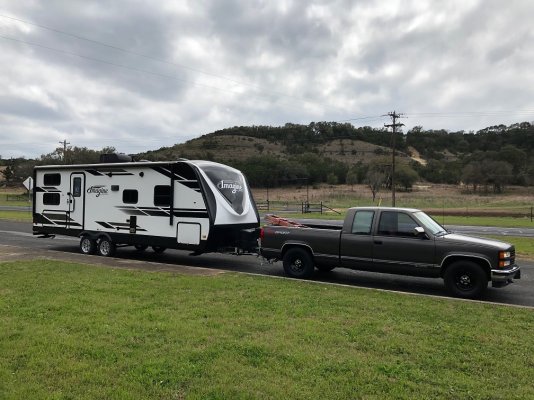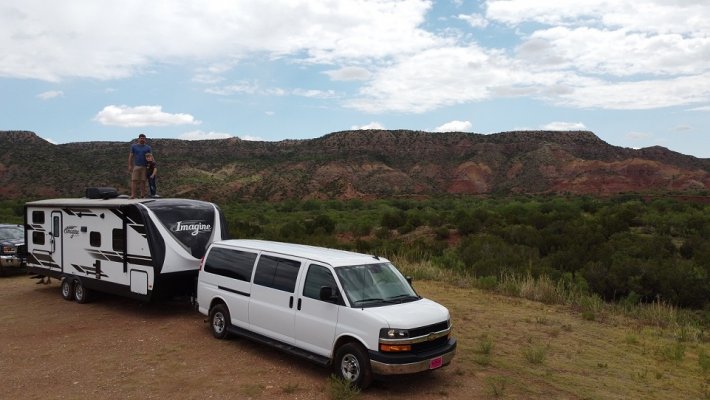9c1fanatic
Active member
- Joined
- Jan 25, 2019
- Posts
- 37
Well I bought the trailer yesterday. A Grand Design 2400BH. I weighed the truck on its own before picking up the RV (including a creeper, 8 ft ladder, 4 way lug wrench, and hitch)
4580 lbs
2540 Front Axle
2040 Rear Axle
I returned to the scales after the PDI and here were the new numbers:
Front Axle 2440 (lost 100 lbs) compared to unloaded
Rear Axle 2720 (gained680 lbs) with tongue weight + WD hitch
Trailer Axles 5360 lbs.
Total combined weight of the whole rig 10,520 lbs. If I subtract the unloaded truck weight of 4580 from 10,520 I get an approximate trailer weight of 5940 (some of this weight is the WD hitch and accessory kit in the trailer, and residual water in the systems) which is not too far off from Grand Design's UVW of 5814.
Am I correct in calculating my tongue weight by subtracting the difference between the before and after rear axle weights on my truck? I realize some of this is the WD hitch but 680 tongue on a 5900 trailer seems pretty close to me. Does anything look concerning with my weights or calculations. As mentioned earlier in the thread my tow vehicle GVWR is 6200.
Also for reference, the truck towed great and handled the trailer well. Rear of truck squatted 1.5 inches total. Obviously not the power and gearing advantage of newer 1/2 tons but will work for now for close range trips.
4580 lbs
2540 Front Axle
2040 Rear Axle
I returned to the scales after the PDI and here were the new numbers:
Front Axle 2440 (lost 100 lbs) compared to unloaded
Rear Axle 2720 (gained680 lbs) with tongue weight + WD hitch
Trailer Axles 5360 lbs.
Total combined weight of the whole rig 10,520 lbs. If I subtract the unloaded truck weight of 4580 from 10,520 I get an approximate trailer weight of 5940 (some of this weight is the WD hitch and accessory kit in the trailer, and residual water in the systems) which is not too far off from Grand Design's UVW of 5814.
Am I correct in calculating my tongue weight by subtracting the difference between the before and after rear axle weights on my truck? I realize some of this is the WD hitch but 680 tongue on a 5900 trailer seems pretty close to me. Does anything look concerning with my weights or calculations. As mentioned earlier in the thread my tow vehicle GVWR is 6200.
Also for reference, the truck towed great and handled the trailer well. Rear of truck squatted 1.5 inches total. Obviously not the power and gearing advantage of newer 1/2 tons but will work for now for close range trips.



